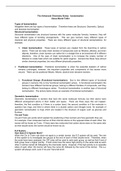Chemistry
John Ruskin College
All 10 results
Sort by
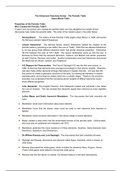
-
The Advanced Chemistry Series: The Periodic Table
- Study guide • 8 pages • 2020
-
Available in package deal
-
- $7.03
- + learn more
Properties of the Periodic Table Who Created the Periodic Table? It wasn’t just one person who created the periodic table; but was altogether ten people whose discoveries help create the periodic table.
Types of Isomerisation Altogether there are four types of Isomerisation. Therefore these are Structural, Geometric, Optical, and Absolute Isomerisation.
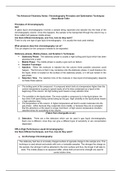
-
The Advanced Chemistry Series: Chromatography Principles and Optimisation Techniques
- Class notes • 10 pages • 2020
-
Available in package deal
-
- $7.03
- + learn more
Principles of Chromatography GLC In glass liquid chromatography involves a sample being vaporised and injected into the head of the chromatography column. Once this happens, the sample is the transported through the column buy a force called inert gaseous mobile phase.
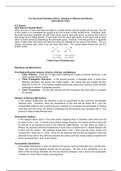
-
The Advanced Chemistry Series: Bonding of Alkanes and Alkenes
- Study guide • 9 pages • 2020
-
Available in package deal
-
- $7.03
- + learn more
E-Z System How does E-Z System Work? When the Cis, or Trans, rule does not apply to a certain isomer, the E-Z system will be used. The role of this system is to investigate two groups at the end of each of their double bond. Therefore, when the ends have been analysed; the CIP rules will be used to rank each group; as well as find if end of both group have a higher priority. If both ends have the same high priority on the same side as each other; it will be named (Z) followed by the chemicals...
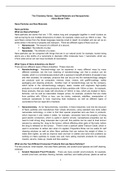
-
The Chemistry Series: Special Materials and Nanoparticles
- Study guide • 13 pages • 2020
-
Available in package deal
-
- $7.03
- + learn more
Nano-Particles and New Materials Nano-particles What are Nano-Particles? Nano-particles are atoms that are 1-100, meters long and congregate together in small clusters as well as having its own multiple dimensions of orders, for example, orders such as 100nm or less. The word Nano comes from the Greek language meaning small or dwarf, its smallest unit can act as an entire entity in the terms of property and transport
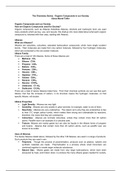
-
The Chemistry Series: Organic Compounds in our Society
- Study guide • 15 pages • 2020
-
Available in package deal
-
- $7.03
- + learn more
Organic Compounds and our Society How are Organic Compounds used for Society? Organic compounds, such as Alkanes Substitute Alkenes, Alcohols and Carboxylic Acid, are used many products which we buy, use, and recycle. We shall go into more detail about what each organic compound is.
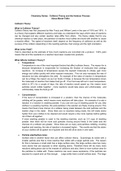
-
Chemistry Series: Collision Theory and the Harbour Process
- Study guide • 4 pages • 2020
-
Available in package deal
-
- $7.03
- + learn more
Collision Theory What is Collision Theory? Collision theory was first purposed by Max Trautz and William Lewis in the year of 1916 and 1918. It is a theory that explains different reactions and helps us understand the ways which rates of reactions can be changed and why certain reaction rates differ from others. The theory states that for any chemical reaction to take place, the particles of reaction must collide and bond with another to cause a reactive effect. The speed of reactions itself...
This bundle contains the study and lecture notes on every Chemistry topic which I have learned.
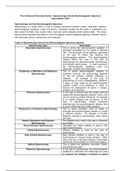
-
The Advanced Chemistry Series: Spectroscopy and the Electromagnetic Spectrum
- Study guide • 4 pages • 2020
-
Available in package deal
-
- $7.03
- + learn more
Spectroscopy and the Electromagnetic Spectrum Spectroscopy is a study which is sued to analyse interactions between matter, molecules, radiation (electromagnetic radiation), nuclei, and atoms. Physicists usually use this study to understand and learn about the black hole, neutron stars, and even active galaxies which produce light. This study also provides important information on how the aspects of electromagnetic spectrum radiation interact with molecules, atoms, compounds, and nucleuses.
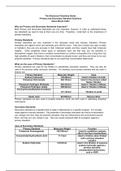
-
The Advanced Chemistry Series Primary and Secondary Standard Solutions
- Study guide • 2 pages • 2020
-
Available in package deal
-
- $7.03
- + learn more
Why are Primary and Secondary Standards Important? Both Primary and Secondary Standards are very important, however, in order to understand these two standards we need to look at them one at a time. Therefore, I shall start on the importance of primary standards.

Did you know that on average a seller on Stuvia earns $82 per month selling study resources? Hmm, hint, hint. Discover all about earning on Stuvia

